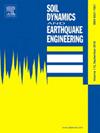利用沸石-水泥注入缓解砂土液化的实验室研究
IF 4.2
2区 工程技术
Q1 ENGINEERING, GEOLOGICAL
引用次数: 0
摘要
在具有液化潜力的土壤中使用水泥基材料缓解液化的研究非常有意义。由于水泥生产是一个成本高昂且污染环境的过程,因此用天然沸石等环境友好且成本较低的材料来替代部分水泥生产是非常重要且有吸引力的。在本研究中,为了评估利用沸石-水泥注入改善松散砂土抗液化性能的情况,进行了一系列三轴试验。此外,还根据弯管元件、无侧限抗压强度和单调三轴试验的结果,对注入试样的液化潜力进行了研究。研究结果表明,在试验砂中注入沸石-水泥灌浆料对缓解砂的液化非常有效。即使在非常强烈的地震中,水与胶凝材料比(W/CM)为 3、沸石(Z)水泥替代率高达 70% 的注入试样也不会发生液化。与最大液化阻力相对应的沸石最佳用量(Zopt)为 30%。研究表明,考虑到能源消耗的优化和环境因素,对于 CSR ≤ 0.2 的地震,通过注入 Z90 和 W/CM 为 5 的注浆,所用砂土的抗液化能力提高了一倍以上。对于更严重的地震(CSR ≤ 0.3),注入含 Z70 和 W/CM 为 7 的灌浆料不会导致液化。在极强烈地震(CSR0.5)下,注入含 Z50 和 W/CM 为 5 的灌浆材料可有效抵御液化。本文章由计算机程序翻译,如有差异,请以英文原文为准。
Laboratory investigation of liquefaction mitigation in sand using zeolite-cement injection
The study on liquefaction mitigation using cement-based materials in soils with liquefaction potential is of great interest. As cement production is a costly and environmentally polluting process, replacing part of it with environmentally friendly and cheaper materials such as natural zeolite is very important and attractive. In the present study, to evaluate the improvement of the liquefaction resistance in loose sand using zeolite-cement injection, a series of triaxial tests was performed. Also, the liquefaction potential of injected specimens was investigated based on the results of bender element, unconfined compressive strength and monotonic triaxial tests. The results of the study indicated that the injection of tested sand with zeolite-cement grout is significantly effective in liquefaction mitigation of the sand. Even under very strong earthquakes, liquefaction did not occur in the injected specimens with water to cementitious materials' ratio (W/CM) of 3 and a cement replacement with zeolite (Z) up to 70 %. The optimum amount of zeolite (Zopt) corresponding to the maximum liquefaction resistance was 30 %. It was shown that, considering the optimization of energy consumption as well as environmental considerations, for earthquakes with a CSR ≤ 0.2, by grout injection with Z90 and W/CM of 5, the used sand liquefaction resistance is more than double. For more severe earthquakes (CSR ≤ 0.3), injection with a grout containing Z70 and W/CM of 7 resulted in no liquefaction. To counteract the liquefaction under very strong earthquakes (CSR0.5), grout injection with Z50 and W/CM of 5 can be effective.
求助全文
通过发布文献求助,成功后即可免费获取论文全文。
去求助
来源期刊

Soil Dynamics and Earthquake Engineering
工程技术-地球科学综合
CiteScore
7.50
自引率
15.00%
发文量
446
审稿时长
8 months
期刊介绍:
The journal aims to encourage and enhance the role of mechanics and other disciplines as they relate to earthquake engineering by providing opportunities for the publication of the work of applied mathematicians, engineers and other applied scientists involved in solving problems closely related to the field of earthquake engineering and geotechnical earthquake engineering.
Emphasis is placed on new concepts and techniques, but case histories will also be published if they enhance the presentation and understanding of new technical concepts.
 求助内容:
求助内容: 应助结果提醒方式:
应助结果提醒方式:


